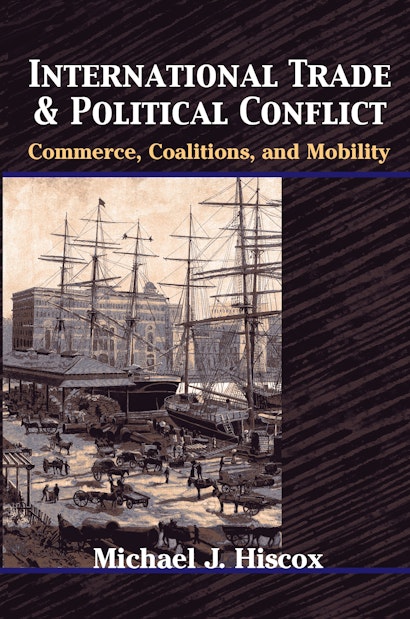This book unveils a potent new approach to one of the oldest debates in political economy—that over whether class conflict or group competition is more prevalent in politics. It goes further than any study to date by outlining the conditions under which one type of political conflict is more likely than the other. Michael Hiscox focuses on a critical issue affecting support for and opposition to free trade—factor mobility, or the ability of those who own a factor of production (land, labor, or capital) to move it from one industry to another. He argues that the types of political coalitions that form in trade politics depend largely on the extent to which factors are mobile between industries. Class coalitions are more likely where factor mobility is high, Hiscox demonstrates, whereas narrow, industry-based coalitions predominate where it is low.
The book also breaks new ground by backing up the theory it advances with systematic evidence from the history of trade politics in six nations over the last two centuries, using a combination of case studies and quantitative analysis. It makes fresh conclusions about the forces shaping trade policy outcomes—conclusions that yield surprising insights into the likely evolution of the global trading system and U.S. trade policy in particular. International Trade and Political Conflict is a major contribution to the scholarly literature while being accessible to anyone interested in understanding and predicting developments in trade policy.
Awards and Recognition
- Co-Winner of the 2003 William H. Riker Book Award
Michael J. Hiscox is the John L. Loeb Associate Professor of the Social Sciences at Harvard University. This book is based on his dissertation, done at Harvard University, which was awarded the Helen Dwight Reid Prize for Best Dissertation in International Relations by the American Political Science Association in 1997.
"Where others have only speculated about the extent and effects of factor mobility on trade conflicts and policies, or have offered only specific and partial assessments, Michael Hiscox—in a series of pathbreaking articles, and now in this culminating book—covers almost the entire waterfront. First offering an overview of historical changes in factor mobility, and in conflicts over trade policy, in six major nations, he then presents a detailed and historically astute case study of each of the six. Finally, and trumping virtually all previous work by Americanists, Hiscox magisterially surveys the U.S. case from 1824 to the present: changes in U.S. factor mobility, in American trade-policy coalitions, and in Congressional roll-call votes. The result is both an impressive verification of the essential Stolper-Samuelson insight (that trade divisions follow class lines only when factors are mobile) and a neat illumination of formerly opaque mysteries about domestic political conflicts."—Ronald Rogowski, University of California, Los Angeles, author of Commerce and Coalitions: How Trade Affects Domestic Political Alignments
"Michael Hiscox's book proposes an extraordinarily intuitive yet powerful solution to the debate over what drives the politics of international trade—that whether class or industry rules trade politics depends on the cost of shifting uses (i.e. industries) for one's productive assets. I have absolutely no doubt that his solution will quickly become the textbook approach to the problem. But the contribution is much greater than that. Namely, Hiscox provides an enormously valuable and comprehensive multimethod test of the theory, using multiple countries and time periods, going far beyond all empirical work previously conducted on the subject."—Eric Reinhardt, Emory University

